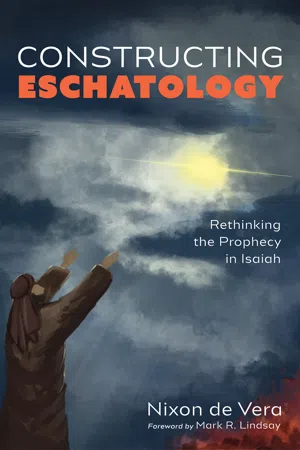![]()
Chapter I
Unseen Compassion
“Holy, holy, holy is the Lord of hosts;
the whole earth is full of his glory.”
This chapter explores the predictive declarations of the prophet Isaiah concerning the people of Israel. It will be argued that despite the confusions inherent in Isaiah about God’s dealing with Israel, there is a way to conceive God as the One who foreordains in love. To support this, I will begin with pericopes in the first twelve chapters of Isaiah in which the concepts of foreordination and divine love appear.
Principally, the chapter is concerned with the following questions. Is God truly sovereign in the affairs of Israel? Also, to what extent can this sovereignty be applied to the fall of Zion? To what degree might this sovereignity represent God’s love, notwithstanding the seemingly predetermined captivity and exile of the Jews? In response, the following will be examined: (1) the prophet’s warning of invasion and destruction in view of foreordination; (2) the relation of divine judgment to divine compassion in light of the covenant with Israel; (3) judgment as contributory to God’s healing; (4) Jerusalem as the locus of eschatological hope for humankind.
Let us now turn to the first section of Isaiah with the emphasis on God as sovereign.
1. Summary of Isaiah 1–12
This section focuses on the prophet’s vision of judgment and hope for Jerusalem. It begins with the accusation of the leaders of Jerusalem for insurrection through idolatry and injustice. Here the sovereign God was about to judge the city by sending heathen nations to conquer Israel. According to Isaiah, the judgment would be like a purifying fire that burns away all dross in Israel to give way to the new Zion. The remnant would populate the new Zion. When all nations heard about the kingdom of God and learned justice and righteousness, they would come to the temple in Jerusalem. This ushered in the age of universal peace and harmony.
At the outset, the storyline of the transformation of old Zion into the new Zion is repetitive throughout Isaiah but rendered with increasing detail. In the middle of the section, the prophet sees God (through a vision) sitting on his glorious throne in the heavenly temple and strange creatures around the throne shouting, “Holy, holy, holy, is the Lord!” While in awe, the prophet suddenly realized how corrupt he was and, by extension, Israel. He was sure that God’s holiness would destroy him, yet, fortunately, such holiness (depicted by a burning coal) burned Isaiah’s filth instead, not his body and soul. That demonstrated the purification of his sin, applicable to Israel, too. With this thought, the prophet was encouraged to keep announcing the coming judgment because of the purification that came with it.
Notably, Israel had reached a point of no return in which the prophet’s warning was to have a paradoxical effect of hardening the people; nonetheless, such hardening is part of the Lord’s master plan. Israel was about to be chopped down like a tree and left like a stump in the field. In due time that stump would be burned. But after burning, God declared that this smoldering stump would be a holy seed that would survive into the future. This was a beacon of hope. Who was the holy seed?
The holy seed, Isaiah predicted, was David’s descendant—a king of Jerusalem. Yet the seed would arrive after the sack of Jerusalem. God would raise Assyria to chop down Israel by devastating the land, but that was not the end of it. In fulfillment of the promise to David, the beacon of hope would reign afterward as the king of the new Jerusalem. The king would also be called “Immanuel” (God with us), and his kingdom was to free Israel from the shackle of the imperial overlords; hence Israel was the small shoot coming out of the smoldering stump. Crucially, the shoot likewise represented the coming of the holy seed stemming from the old stump of David’s family. King Immanuel of the new Jerusalem w...
